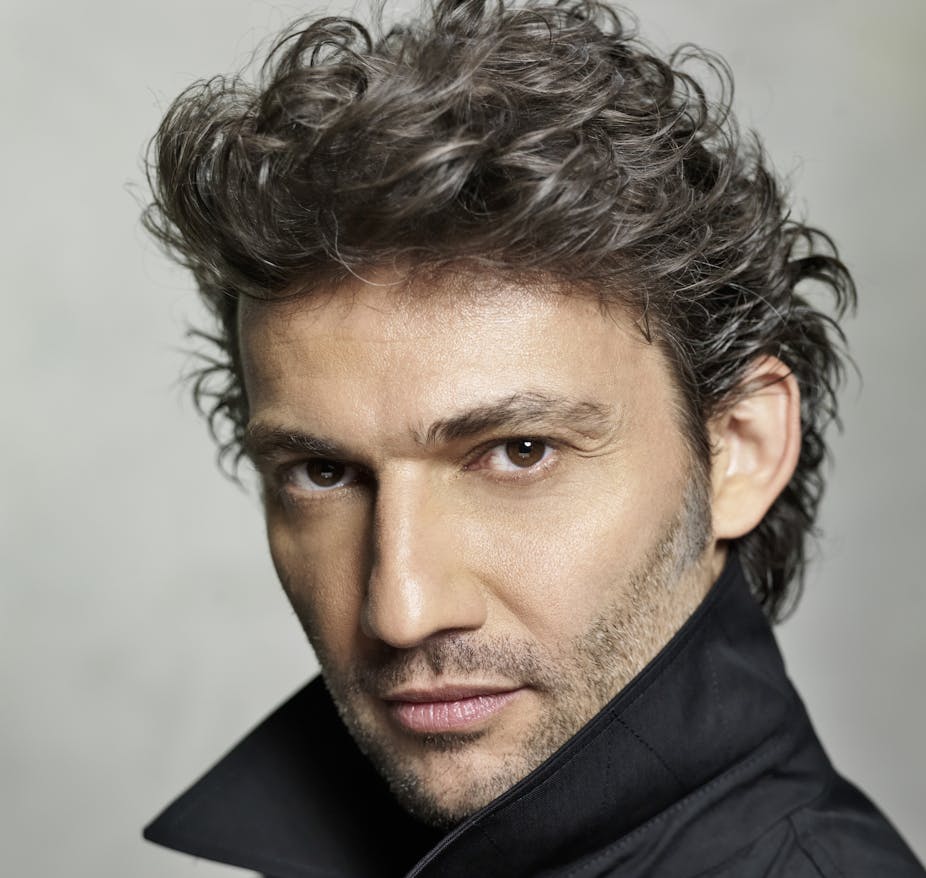Jonas Kaufmann, currently the world’s hottest tenor, is a freak.
Kaufmann, who will sing at the Sydney Opera House during his first Australian visit next month, has broken the mould for what might be expected from a top operatic tenor. The only current tenor who inhabits a similar space is Placido Domingo, who these days is singing as a baritone rather than tenor. (The Spaniard is in his 70s, so might be excused!)
Tenors gone by
In the past, most of the great tenors have sung in one, or maybe two areas of the opera repertoire at most.
Enrico Caruso, who really started our modern fetish with the tenor voice at the beginning of the 20th century, sang gloriously, but predominantly in the Italian repertoire. He earned his fame singing the works of composers such as Donizetti, Bellini, Verdi, Puccini, Leoncavallo and others – as well as some French composers such as Bizet, Gounod and Massenet, but mostly in Italian translation.
Caruso’s successors such as Beniamino Gigli, Giovanni Martinelli, Mario Del Monaco, Franco Corelli, Carlo Bergonzi and Luciano Pavarotti, all covered similar areas of the repertoire. Celebrated Swedish tenor Nicolai Gedda, who has possibly made more recordings than any other tenor, had superb linguistic skills, and sang a wider range of roles than these singers, but mainly within the lyric tenor area.
A new tenor
But Kaufmann, at the age of only 44, has already established his supremacy in the Italian, French and – unlike most of the other tenors mentioned – the German repertoire as well, particularly in the operas of Richard Wagner.
This is the crucial area of repertoire which sets him apart from his predecessors. Kaufmann has sung several of the major Wagnerian heldentenor roles and has spoken recently about the possibility of singing Tristan and Siegfried – two roles regarded as probably the most demanding of all. He is also talking about Verdi’s Otello, possibly the most demanding dramatic tenor role in Italian.
So what makes Kaufmann so special, able to flit between the lyric and the more dramatic areas of the operatic repertoire?
First, and most importantly, it is the unique quality of his voice and his impressive vocal technique. It’s a particularly dark sound, much like a baritone in timbre, with a warmth and fullness that sometimes seems too heavily weighted for the type of music he often sings.
Listening to the middle range of his voice, it seems unlikely that a voice of this weight would be able to soar to the top of the range with the ringing quality that characterise his top notes.
A good example occurs in the famous aria, Salut! demeure chaste et pure, from Gounod’s Faust. He sounds almost baritonal in much of the aria, frequently sung by much lighter voices, but in the big moment that everyone is waiting for, the phrase rising to the high C – the tenor’s “money note” – the voice effortlessly achieves the required fullness, brilliance and ring in the tone.
All eyes on the tenor
In addition to Kaufmann’s truly unique vocal and musical gifts is the fact that he has the looks of an Armani model.
There has been some recent heat generated in the media regarding sexist remarks made by mainly male reviewers of a particular female singer in a recent British opera production.
The unalterable fact is that looks are playing an increasing role in opera. A lot of this is driven by opera productions being relayed into cinemas, but also by increasing audience expectations that singers be physically believable in their roles. This has the unfortunate result that singers are frequently cast in roles that they are not yet ready to sing, which can permanently damage their voices.
Kaufmann is tall, slim and very good looking, and his face and sometimes his torso are used to sell CDs and DVD in great quantities. But he is an excellent actor, and not just some operatic beefcake.
He also has another string to his bow – he is a dedicated and highly accomplished art song singer.
Apart from Gedda, few of the tenors mentioned above had much to do with this genre unless it was popular Neapolitan songs and the “popera” in more recent times that occupied Pavarotti, Carreras and Domingo. Kaufmann programs dedicated lieder recitals into his busy schedule – this is an art form that many singers regard as the supreme vocal achievement.
To great acclaim he has performed and recorded the two great Schubert songs cycles, Die schöne Müllerin and Winterreise, perhaps the two Everest-like peaks for a singer to conquer, as well as several other Lieder CDs.
So where to from here?
The only area of repertoire that he is not active in, like many of his contemporaries, is contemporary opera. In a recent interview he remarked that he finds the musical idiom of much recent opera uncongenial for his voice.
The question is, are there composers out there who might be spurred on by this comment?
Jonas Kaufmann performs at the Sydney Opera House in August. Details here.

